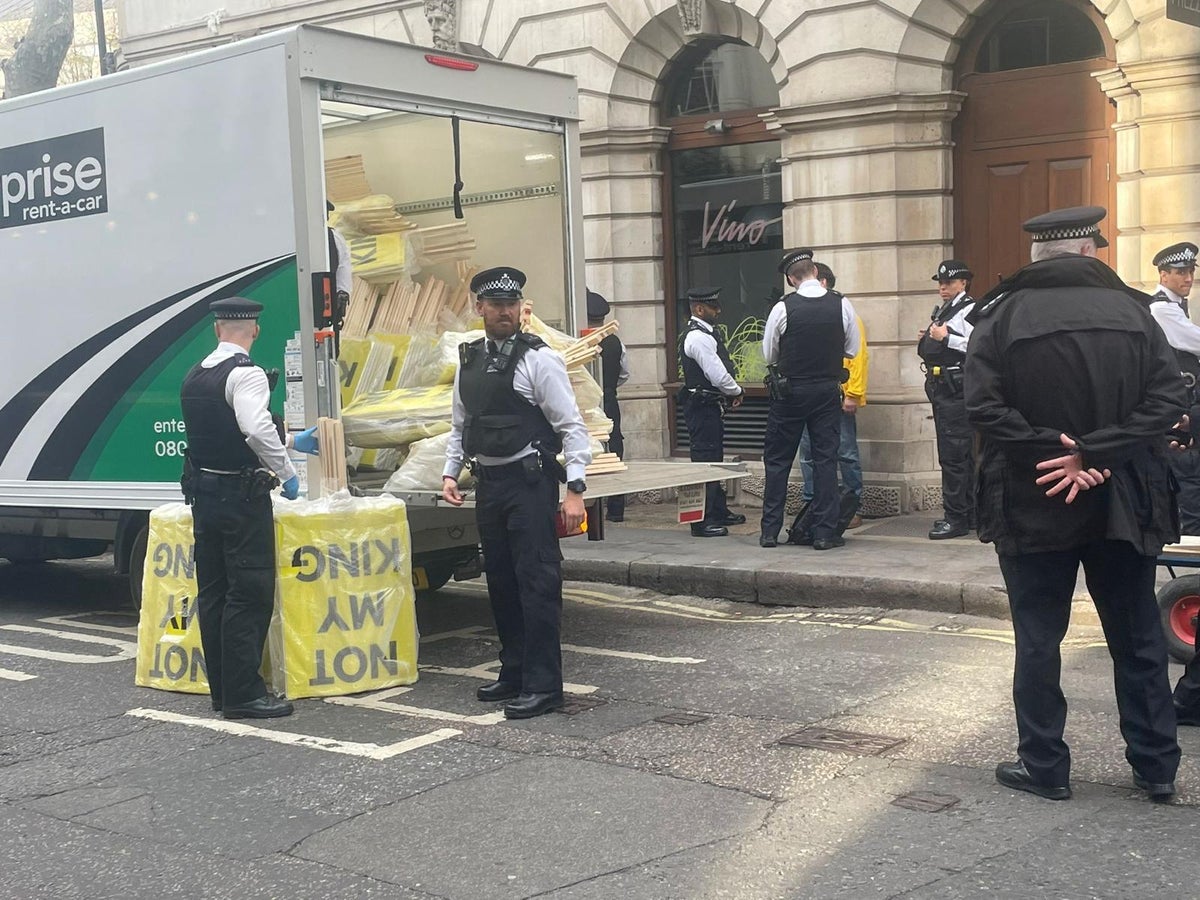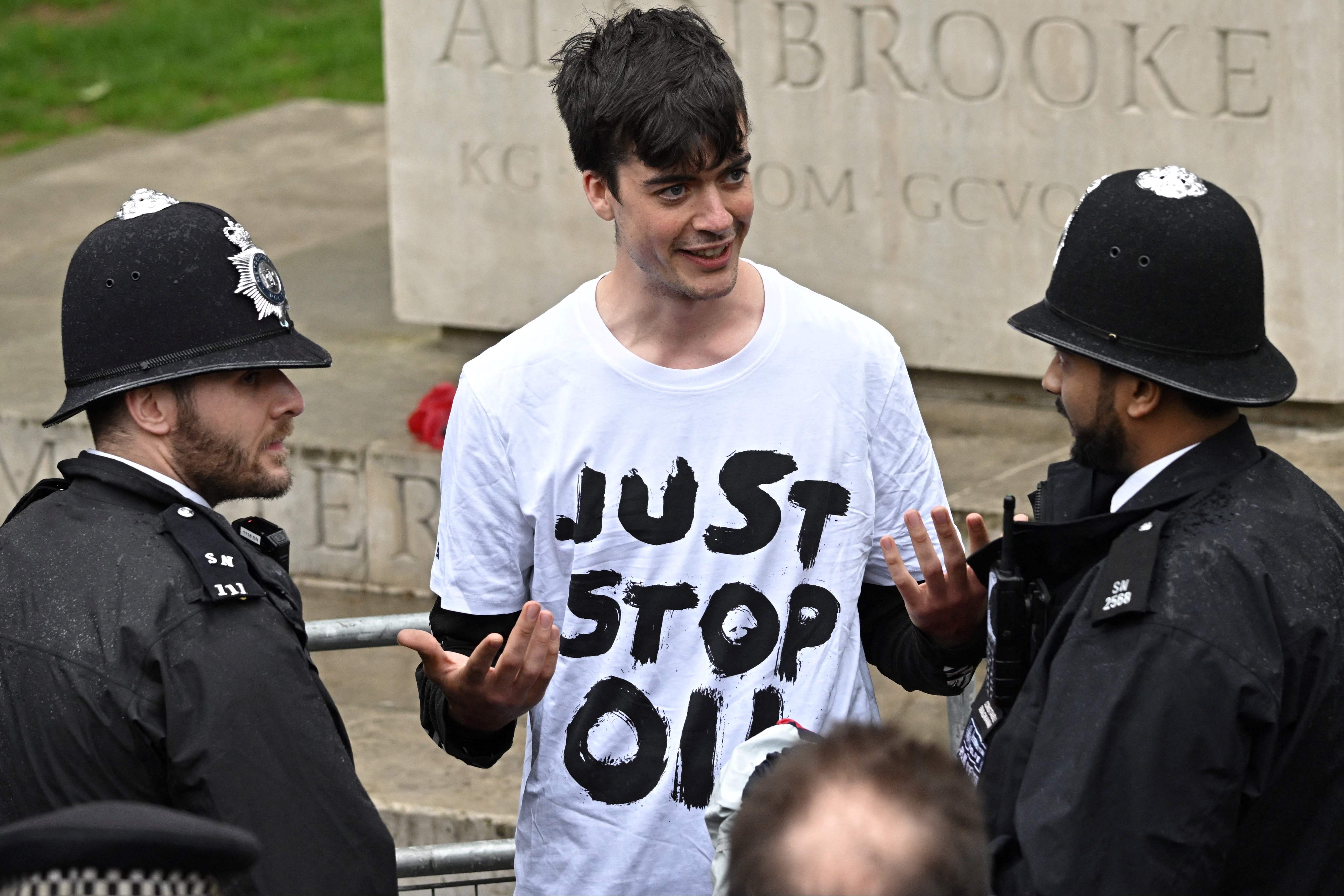
Dozens of protesters from anti-monarchy and environmental groups have been arrested in London ahead of the coronation of King Charles III, in what they slammed as a “dystopian nightmare”.
The Metropolitan Police had said it would facilitate anti-monarchy demonstrations unless they contravened existing laws, or new powers that came into force last week banning “locking-on” and causing “serious disruption”.
But supporters of the Republic campaign group were arrested on Saturday morning and saw hundreds of placards reading “Not My King” seized by the force.
“This morning, [chief executive] Graham Smith and five members of our team were arrested. Hundreds of placards were seized,” the group wrote on Twitter. “Is this democracy?”
Mr Smith was arrested on the edge of Trafalgar Square, where Republic had sought permission from Scotland Yard to hold a rally.
Amnesty International UK was among the human rights group raising alarm about the arrests, saying peaceful protest was “clearly protected” under international law.
A spokesperson for the Metropolitan Police said four people had been “held on suspicion of conspiracy to cause public nuisance”, and that “lock-on devices” had been seized. No further details were given.
Footage showed demonstrators in yellow “Not My King” T-shirts, including Mr Smith, having their details taken by officers.
One of the protesters joining the Republic rally, 30-year-old Harry Stratton, told The Independent that the amount of public money being spent on a “parade for someone who's already [King] when there's homeless people sitting on the steps of Westminster Abbey right now” was “crazy”.
“This morning, they've already arrested six main organisers and seized our placards,” he added. “They won't tell us why they arrested them they won't tell us where they're taking them.”
Mr Stratton said police had told him that anyone getting in the way of the coronation procession “might get shot at”, adding: “They said ‘slogans. chanting - go for it - but if you start saying Andrew and the sex stuff we will start arresting.”

Other Republic protesters told The Independent police had told them that they “can’t shout anything that may be deemed offensive” and were not letting them enter the area agreed for their rally in advance.
The Public Order Act 1986 was applied to signs or statements that some found offensive during the proclamation of King Charles III in September, with a man who shouted “who elected him?” getting charged with “threatening or abusive words or behaviour … within the hearing of a person likely to be caused harassment, alarm or distress”.
Patrick Thelwell, who was convicted for throwing eggs at King Charles last month, was “dragged off” from the anti-monarchy protest in Trafalgar Square and searched, a fellow demonstrator told The Independent. He was released after nothing was found.
A further three people were arrested around a mile away near Wellington Arch, by Hyde Park Corner, on suspicion of possessing articles to cause criminal damage.
The Metropolitan Police said it also made “a number of arrests in the area of Carlton House Terrace”, which runs parallel to The Mall, on suspicion of breaching the peace.
Environmental protest group Just Stop Oil reported that around 20 of its demonstrators had been arrested, with photos showing a man wearing a T-shirt emblazoned with the group’s slogan being detained in Whitehall, which leads to the Houses of Parliament.
The group said he was a 33-year-old doctor who was “planning to quietly hold a sign saying JUST STOP OIL, whilst in the crowd for the coronation”.

“He was arrested along with 20 others,” Just Stop Oil tweeted. “Free speech is a core British value – and we have just lost it. No supporters of Just Stop Oil arrested in the crowd had glue, paint or any plans to disrupt the coronation. We are living in a dystopian nightmare.”
In a press conference ahead of the coronation, the Metropolitan Police announced they would have an “extremely low threshold” for protests during the celebrations, and that demonstrators could expect “swift action” if they broke the law.
But deputy assistant commissioner Ade Adelekan said officers would not intervene over someone merely “holding a placard” in London.
“Protest is lawful,” he told a press conference on Wednesday. “If at any point any protest, either during the coronation or afterwards, moves from being a protest that is lawful into criminal intent then you will see extremely swift action from us.”
A controversial package of new laws came into force when the Public Order Act received royal assent on Tuesday, making it illegal for protesters to lock onto objects or each other, or possess items for that purpose.

Suella Braverman, the home secretary, called for police to “make full use” of the new powers and hit out at “so-called ‘eco-warriors’ causing disruption and wasting millions of pounds of taxpayer money”.
The law created a new threshold for police intervention against “serious disruption”, including hindrance to journeys, deliveries and services, allowing the arrest of demonstrators who break any conditions imposed.
Another controversial package of protest laws brought in last year made “public nuisance” a new criminal offence.
Sacha Deshmukh, the chief executive of Amnesty International UK’s chief executive, said: “We need to see what details emerge around these incidents but merely being in possession of a megaphone or carrying placards should never be grounds for a police arrest.
“Peaceful protest is clearly protected under international human rights law and it’s been worrying to see the police this week making numerous statements about their ‘low tolerance’ for disruption at the coronation.

“We’ve recently had the introduction of extremely draconian legislation outlawing ‘disruptive’ or ‘noisy’ protests, which has given the police excessive – and highly subjective – powers and seriously damaged people’s right of free speech and public assembly.
“The coronation shouldn’t become yet another excuse for undermining people’s basic human rights in this country.”
The Liberty human rights group said protest was a “fundamental right, not a gift from the state”, and threats to the freedom had become “particularly clear in the lead up to the coronation”.
Advocacy director Sam Grant said: “Already in recent days we have seen protest groups sent intimidatory letters, anti-protest laws rushed through, and facial recognition being deployed against millions of people. And this morning we saw people arrested before they started protesting – despite having been given the go-ahead by police.
“This is extremely concerning and sets a dangerous precedent for us as a democratic nation. Our right to protest must be protected, not clamped down on.”
The policing and security operation around the coronation, codenamed Golden Orb, is one of the largest ever seen in Britain, with 11,500 police officers on duty on Saturday.







